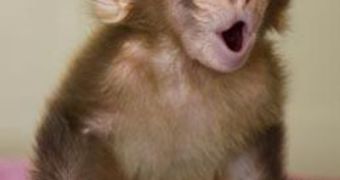In groundbreaking, new studies, genetics engineers have managed to create monkeys that have none of their parents' mutations, which are usually passed from one generation to the other via mitochondrial DNA. In their experiments, the research team, from the Oregon National Primate Research Center, in Beaverton, succeeded in swapping nuclear DNA from one unfertilized rhesus monkey egg into another, similar one, which had had its nuclear material removed in advance. Two offspring were obtained that were completely healthy, the team reports in the latest issue of the respected scientific journal Nature.
Expert Shoukhrat Mitalipov, the leader of the US team, says that most diseases transmitted through genetic material from mothers to offspring can be stopped by a DNA swap. Chromosomes from the nuclear material in one egg are transplanted into another, also-unfertilized egg, which is apparently able to produce viable offspring. Mito and Tracker are the names of the two rhesus monkeys that were obtained through the new study, the team proudly reports.
Mitalipov also reveals that the results of the new method are similar to those obtained via in-vitro fertilization (IVF). Out of the 15 embryos that were transplanted into four surrogate mothers, four offspring were born, out of which two were twins. Three of the monkeys became pregnant following the procedure, the Nature paper also shows. “We knew the approach would be pretty efficient but did not expect that mitochondrial DNA replacement would be complete,” the expert says. The team discovered virtually no trace of the donor mother's mitochondrial DNA in Mito and Tracker.
The experts acknowledge the fact that the procedure could be a lot more complex and sensitive in humans, but argue that there is no reason why it should be considered impossible for our species as well. If it turns out that this technique can, indeed, be applied to humans too, then this would have far-reaching implications. Parents suffering from genetic disorders that have a high chance of being transmitted to their children could benefit from DNA transplant, so that scenario is averted.
“There are costs and risks, but the benefits outweigh the drawbacks,” University of Miami in Florida cell biologist Carlos Moraes concludes. He is also a member of the United Mitochondrial Disease Foundation's (UMDF) Scientific and Medical Advisory Board, based in Pittsburgh, Pennsylvania, Nature News reports.

 14 DAY TRIAL //
14 DAY TRIAL //